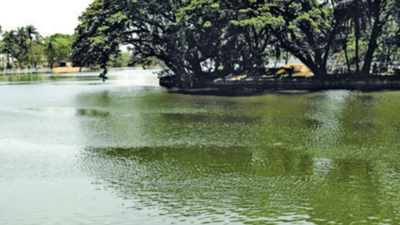Top Searches
- News
- City News
- bengaluru News
- '35% of Bengaluru lakes unfit for aquatic life'
'35% of Bengaluru lakes unfit for aquatic life'

A water quality analysis of Bengaluru lakes by Karnataka State Pollution Control Board (KSPCB) has revealed that 36 waterbodies are not suited for aquatic life
BENGALURU: A water quality analysis of Bengaluru lakes by Karnataka State Pollution Control Board (KSPCB) has revealed that 36 waterbodies are not suited for aquatic life. Water from these lakes can only be used for irrigation, industrial cooling and controlled waste disposal.
The monthly water quality monitoring of lakes is a routine affair. KSPCB monitors 278 lakes in Karnataka, 106 of which are in Bengaluru.
According to the data, the quality of nearly 35% of the city's lakes is dangerous for fish. It may be recalled that between 2017 and 2022, a total 32 fish-kill incidents were reported from Bengaluru, raising concerns among environmentalists.
KSPCB data shows that in the month of April this year, 33 lakes were in 'E category', non-conducive for fish, and the number jumped to 37 in June, while falling to 36 in July. The rest of the waterbodies are in 'D category', which means they can be utilised for propagation of wildlife and fishery. None of the lakes in the tech corridor is in A, B or C categories. Lakes categorised as 'A' are fit to be a drinking water source without conventional treatment, but after disinfection. 'B category' lakes can be used for outdoor bathing, whereas 'C category' ones can be used as drinking water source, but after conventional treatment as well as disinfection.
The major lakes that have been in the 'E category' for three months continuously are Sarakki, Ulsoor, Yelemallappa, Lalbagh and Herohalli lakes, among others. Thirty-two lakes have figured in the 'E-category' during all three months.
Raghavendra Pachhapur, a lake activist who has been closely monitoring fish-kill incidents and water quality of lakes, told TOI that BBMP should on priority visit these lakes and investigate if there are any live polluting streams running into these waterbodies and arrest the decay immediately. "The Palike should hold consultations with experts to understand what measures can be taken to reduce nutrient levels in lake water and what kind of grass can help reduce the same. It should on priority take up plantation of the suggested grass in all these lakes to improving their water quality," Pachhapur added.Ramprasad V, another lake activist, said that KSPCB and BBMP have to work together to identify the cause for deterioration of water in lakes. He said otherwise activists will have no option but to take legal steps. BBMP chief commissioner Tushar Giri Nath said that unless sewage flow into lakes is brought down to zero, water quality will continue to deteriorate.
The monthly water quality monitoring of lakes is a routine affair. KSPCB monitors 278 lakes in Karnataka, 106 of which are in Bengaluru.
According to the data, the quality of nearly 35% of the city's lakes is dangerous for fish. It may be recalled that between 2017 and 2022, a total 32 fish-kill incidents were reported from Bengaluru, raising concerns among environmentalists.
KSPCB data shows that in the month of April this year, 33 lakes were in 'E category', non-conducive for fish, and the number jumped to 37 in June, while falling to 36 in July. The rest of the waterbodies are in 'D category', which means they can be utilised for propagation of wildlife and fishery. None of the lakes in the tech corridor is in A, B or C categories. Lakes categorised as 'A' are fit to be a drinking water source without conventional treatment, but after disinfection. 'B category' lakes can be used for outdoor bathing, whereas 'C category' ones can be used as drinking water source, but after conventional treatment as well as disinfection.
The major lakes that have been in the 'E category' for three months continuously are Sarakki, Ulsoor, Yelemallappa, Lalbagh and Herohalli lakes, among others. Thirty-two lakes have figured in the 'E-category' during all three months.
Raghavendra Pachhapur, a lake activist who has been closely monitoring fish-kill incidents and water quality of lakes, told TOI that BBMP should on priority visit these lakes and investigate if there are any live polluting streams running into these waterbodies and arrest the decay immediately. "The Palike should hold consultations with experts to understand what measures can be taken to reduce nutrient levels in lake water and what kind of grass can help reduce the same. It should on priority take up plantation of the suggested grass in all these lakes to improving their water quality," Pachhapur added.Ramprasad V, another lake activist, said that KSPCB and BBMP have to work together to identify the cause for deterioration of water in lakes. He said otherwise activists will have no option but to take legal steps. BBMP chief commissioner Tushar Giri Nath said that unless sewage flow into lakes is brought down to zero, water quality will continue to deteriorate.
FOLLOW US ON SOCIAL MEDIA
FacebookTwitterInstagramKOO APPYOUTUBE
Start a Conversation
end of article










